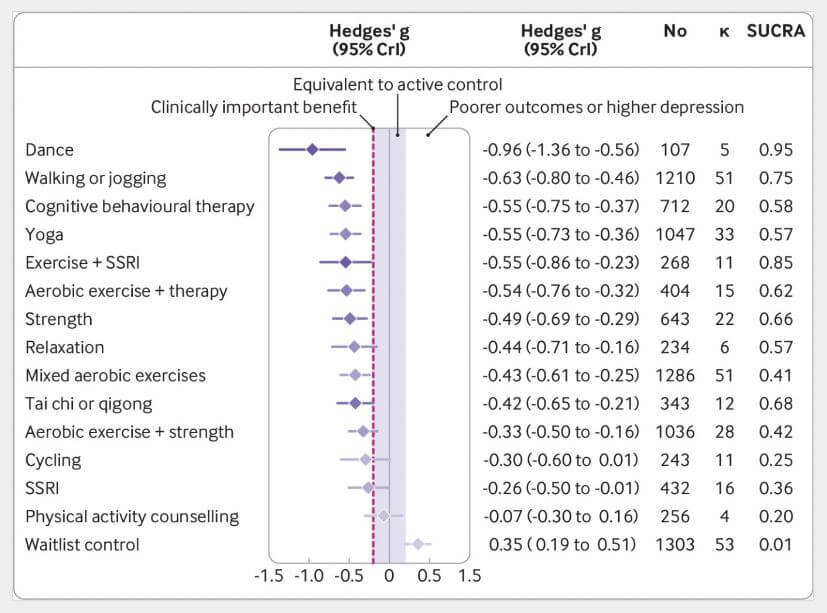An article published last week in the British Medical Journal has been creating some online buzz. The research compared a range of clinical and not-so-clinical treatments for depression, with surprising results.
SSRI drugs, a common GP prescription treatment for depression, were shown to be somewhat effective. But they were not nearly as effective a treatment as dance, walking, or yoga. The image below comes from “Effect of exercise for depression: systematic review and network meta-analysis of randomised controlled trials“.

How was this finding reached? Researchers undertook a “systematic review and network meta-analysis” of all the major databases for medical and psychological research. The ultimate findings took into account the results from 218 separate research studies involving over 14,000 participants. The significance of any one study was downgraded if it focused on only a specific gender, age group, or group with a comorbidity (e.g. overweight).
It’s clear from the table that taking up regular exercise is a strikingly effective response for depression. However, cognitive behavioural therapy (CBT) also scored very highly amongst all treatment responses. Indeed, it scored meaningfully higher than taking up strength training (weightlifting), cycling or tai chi. This suggests that getting a depressed person to CBT and regular exercise is the best route out of depression that we know of.
Of course, there is a chicken-and-egg dynamic at play here. It is a struggle to get depressed people to take sustained action, and those most willing to do so are arguably those scoring the highest on medical questionnaires in studies like those reviewed by the BMJ.
The BMJ authors were, nonetheless, unsurprisingly conservative about sticking with the benefits of SSRIs, given that they are the treatment widely resorted to at present. “These forms of exercise,” researchers said, “could be considered alongside psychotherapy and antidepressants as core treatments for depression.”
SSRI drugs – prozac, zoloft, celexa, paxil – are a common treatment for depression. A very high number of Australians are treated for depression, with 18% of Australians filling a mental health prescription in FY 2022, according to the Australian Institute of Health and Welfare. Reports from overseas suggest antidepressant use spiked during the pandemic and has continued to climb since.
Thumbnail image courtesy of @anyutakejbalo via Unsplash.